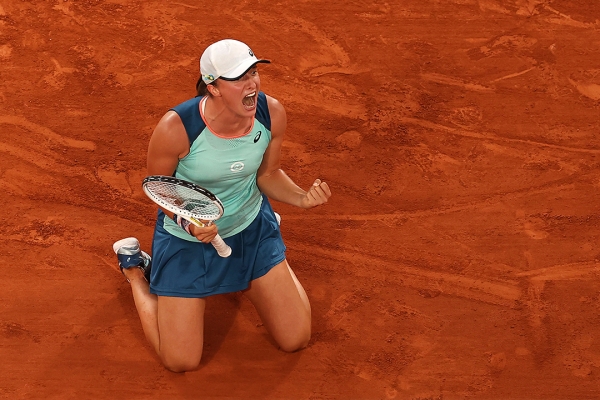Iga Swiatek has capped one of the most dominant recent runs in the sport with victory at Roland Garros.
The young Polish star intensified her already-crushing grip on the world No.1 ranking, thanks to a 6-1 6-3 victory over Coco Gauff in Saturday’s final in Paris.
The victory earned her a sixth straight tournament title and 35th consecutive match win, placing her in illustrious company.
Swiatek was well aware of this, and when asked to consider which of her multiple accomplishments pleased her most, she pointed to her unbeaten run of victories.
NADAL v RUUD: Master v apprentice in Roland Garros final
“Having that 35th (consecutive) win and kind of doing something more than Serena did, it's something special,” Swiatek said.
“Because I always wanted to… have some kind of a record. In tennis it's pretty hard after Serena's career.
“So basically that really hit me. Obviously winning a Grand Slam too, but this one was pretty special because I felt like I've done something that nobody ever done, and maybe it's going to be even more.”

Swiatek, now a two-time major champion with Roland Garros victories in 2020 and 2022, has a long way to go before matching the achievements of Williams’ storied career.
Serena owns three trophies from Roland Garros alone, before considering her stunning overall haul of 23 major singles titles – an Open Era record.
Yet Williams never managed to win more than 34 matches in a row, a milestone Swiatek surpassed when she overwhelmed Gauff in 69 minutes.
That result saw Swiatek equal another icon of the Williams family, Serena’s sister Venus, who produced an unbeaten run of 35 matches in 2000 incorporating titles at Wimbledon, the US Open and the Sydney Olympic Games.
No WTA player this century has won more consecutive matches, something Swiatek could change in her very next match, on grass.
? ?@iga_swiatek x @Venuseswilliams #RolandGarros pic.twitter.com/wb0F8yLicT
— #AusOpen (@AustralianOpen) June 4, 2022
Swiatek explained that growing her streak became a more challenging task at Roland Garros, because unlike the many matches she won earlier in the season at WTA 1000 events, this was a Grand Slam tournament where “the value of these matches are a little bit higher”.
“I felt the baggage,” she admitted.
“The hardest thing is like not letting yourself think about that and overanalyse and not letting yourself think about all the numbers. I have been doing that for a few months now, and for sure, two weeks here were harder, also because (the media) keep reminding me about all this stuff.
“But it's part of the work and I'm getting better and better at it, and that's also something that I'm proud of.
“Before the tournament I was like, OK, is it going to be even possible to beat Serena's result? I realised I would have to be in a final. I was like, Ah, we will see how the first rounds are going to go. I didn't even think about that before.
“But right now I feel like the streak is like more important. I kind of confirmed my good shape.”
“Good shape” is perhaps an understatement, given the 21-year-old is flying head-and-shoulders above the rest of the women’s tour.
When the new WTA rankings are released on Monday, Swiatek is projected to have earned 8631 points – almost double the haul of new world No.2 Anett Kontaveit.
Her lead over second-placed Ons Jabeur in the 2022 points race to the WTA Finals is even greater.
She has won nine finals in a row without dropping a set – notably, Serena won 15 straight finals from 2013 to 2015 – and has built a 21-2 career record at Roland Garros, a winning rate of 91 per cent.
Unbeaten since becoming world No.1 in March, she is also a perfect 3-0 against Gauff – winning all six sets – and is now approaching the best winning streaks of men’s greats Novak Djokovic and Roger Federer; Federer won 42 on the trot in 2006 and Djokovic built a 43-match winning run in 2011.
But it is toward another men’s legend, Rafael Nadal, that Swiatek turns when learning to manage the pressures of performing at the very highest level and attempting to maintain such dominance.
She revealed she would like to add to her streak – she has the option of preparing on grass courts outside her home city of Warsaw, and would enjoy having “no expectations” on the surface – but was also confronting the reality that it would inevitably end.
“I feel like all these great champions, they kind of accept that they may lose,” she said.
“I remember even last year when Rafa lost in semifinals (at Roland Garros to Djokovic), I met him next day, coincidence, on the breakfast in the hotel, and I said to him that I was crying basically the whole evening because he lost.
“He was, like, Oh, it's just a tennis match, you know. You win; you lose. It's normal.
“It's pretty easy, but not everybody can do that and just treat those big moments as another match. That's something special.”
So far, she is doing just that. And it is special indeed.